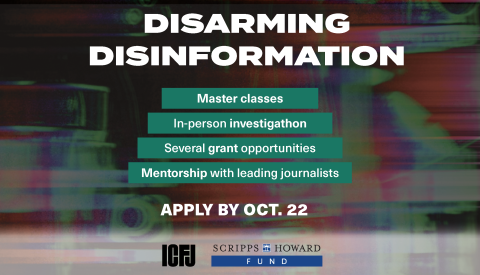
Journalists from across the world have the opportunity to receive funding, mentorship and training to expose the money behind mis- and disinformation targeting voters, as part of the global Disarming Disinformation program. This support comes as political campaigns kick off in dozens of countries across the world, with billions of people slated to take to the polls in 2024 for landmark elections – including in the U.S., India and Mexico.
Reporters, social media strategists, developers and others can receive grant funding for cross-border, collaborative projects investigating electoral disinformation through the initiative. To be eligible, they must first take part in November in master classes led by top experts. The series of online courses are designed to deepen skills and knowledge around tracking electoral disinformation and the role of artificial intelligence in propagating it.
The Disarming Disinformation program is run by the International Center for Journalists (ICFJ), with lead support from the Scripps Howard Fund. This is the second year the program has supported investigations into disinformation.
"We’re focusing on who finances electoral disinformation because of the threat these efforts pose to public trust in democratic institutions,” said Laura Zommer, the co-founder of Factchequeado and an ICFJ Knight Fellow. “There is evidence that common narratives and tactics are replicated across all continents, which merits transnational investigations and analysis.”
Following the master classes, 15 projects will be selected for additional support, and team leads will come together to collaborate in person for a three-day “investigathon.” Investigathon attendees will then be eligible for individual grants and further mentorship to support their investigative projects, as they undertake the complicated task of unmasking disinformation campaigns around elections.
This year, there will be an emphasis on the growing role of artificial intelligence in the proliferation of disinformation, as well as efforts to combat it.
“Recent advances in artificial intelligence have the potential to intensify the threat of disinformation to democratic elections around the world by making it easier for governments, political parties, and non-state actors to manipulate political discourse and undermine trust in democratic elections worldwide,” said Paul Rothman, a Senior Program Director at ICFJ. “But these advances also can provide new opportunities to counter the spread of disinformation.”
Apply here by Oct. 22 to attend the master classes, which will take place from 10 am - 1 pm EST on Nov. 7, 8 and 9. These three-hour online webinars will be led by six mentors this year, including Patricia Campos Mello from Folha de S. Paulo in Brazil; Giannina Segnini from Columbia University; Craig Silverman from ProPublica; Aimee Rinehart from the Associated Press; and researcher Claire Wardle from Brown University. See recordings of last year’s master classes here.
“This program found the most astonishing journalists, and supported them to do really innovative, important investigations,” Wardle said. “It was so inspiring being involved during the first year. I still talk about it!”